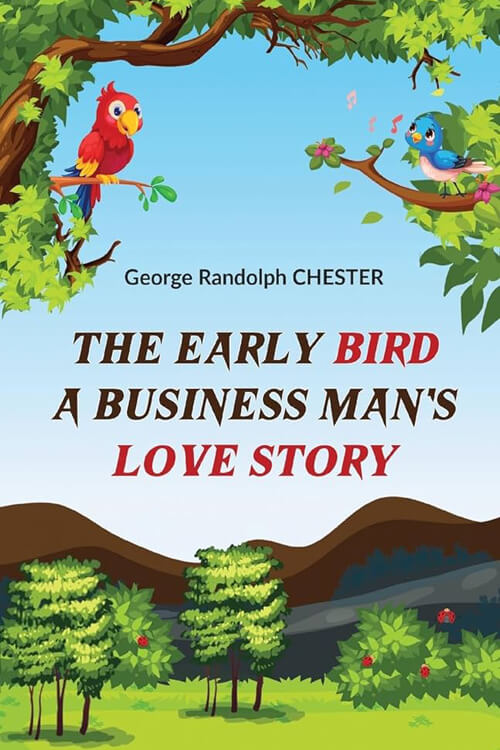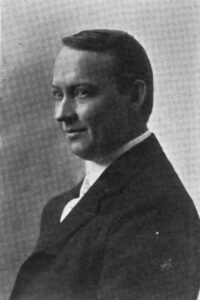
The Early Bird, A Business Man’s Love Story
The youngish-looking man who so vigorously swung off the train at Crestview, wore a pair of intensely dark blue eyes that immediately photographed everything within their range of vision—flat green country, shaded farm-houses, encircling wooded hills and all—weighed it and sorted it and filed it away for future reference; and his clothes clung on him with almost that enviable fit found only in advertisements. Immediately he threw his luggage into the tonneau of the dingy automobile drawn up at the side of the lonely platform, and promptly climbed in after it. Spurred into purely mechanical action by this silent decisiveness, the driver, a grizzled graduate from a hay wagon, and a born grump, as promptly and as silently started his machine. The crisp and perfect start, however, was given a check by a peremptory voice from the platform.
“Hey, you!” rasped the voice. “Come back here!”
As there were positively no other “Hey yous” in the landscape, the driver and the alert young man each acknowledged the name and turned to see an elderly gentleman, with a most aggressive beard and solid corpulency, gesticulating at them with much vigor and earnestness. Standing beside him was a slender sort of girl in a green outfit, with very large brown eyes and a smile of amusement that was just a shade mischievous. The driver turned upon his passenger a long and solemn accusation.
“Hollis Creek Inn?” he asked sternly.
“Meadow Brook,” returned the passenger, not at all abashed, and he smiled with all the cheeriness imaginable.
“Oh,” said the driver, and there was a world of disapprobation in his tone, as well as a subtle intonation of contempt. “You are not Mr. Stevens of Boston.”
“No,” confessed the passenger; “Mr. Turner of New York. I judge that to be Mr. Stevens on the platform,” and he grinned.
The driver, still declining to see any humor whatsoever in the situation, sourly ran back to the platform. Jumping from his seat he opened the door of the tonneau and waited with entirely artificial deference for Mr. Turner of New York to alight. Mr. Turner, however, did nothing of the sort. He merely stood up in the tonneau and bowed gravely.
“I seem to be a usurper,” he said pleasantly to Mr. Stevens of Boston. “I was expected at Meadow Brook, and they were to send a conveyance for me as this was the only conveyance in sight I naturally supposed it to be mine. I very much regret having discommoded you.”
Read or download Book
George Randolph Chester
Chester was born in Cincinnati, Ohio, on January 27, 1869. He was the author of popular works such as Get-Rich-Quick Wallingford and Five Thousand an Hour: How Johnny Gamble Won the Heiress which were made into silent films within his lifetime.
Biography.
His success in selling stories to The Saturday Evening Post leaving his position with the Cincinnati Enquirer and moving to New York City to write fiction was the impetus for James Bearsley Hendryx to buy a typewriter and try his hand at writing fiction.
Chester’s first wife, Elizabeth Chester (whom he had married in Davenport, Iowa in July 1895), divorced George in 1911, using the evidence that he was living at Gainsborough Studios in London with Lillian Josephine Chester. Elizabeth filed for divorce, and George and Lillian married while they were in Europe after hearing that the divorce was finalized.
However, Elizabeth had only been granted an interlocutory decree, which made the divorce not final and therefore made his subsequent marriage to Lillian controversial. George and Lillian worked on several stories and plays together. George and Lillian only directed one film together, The Son of Wallingford (1921), which has been lost. Chester died on February 26, 1924, of a heart attack in his New York City home.






